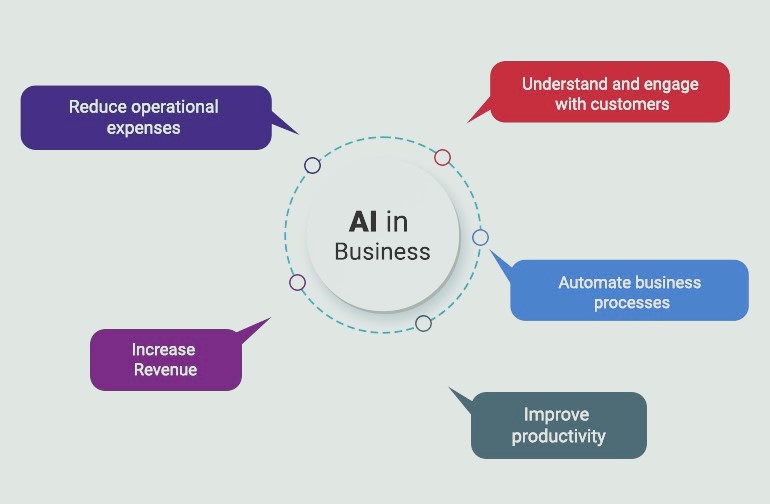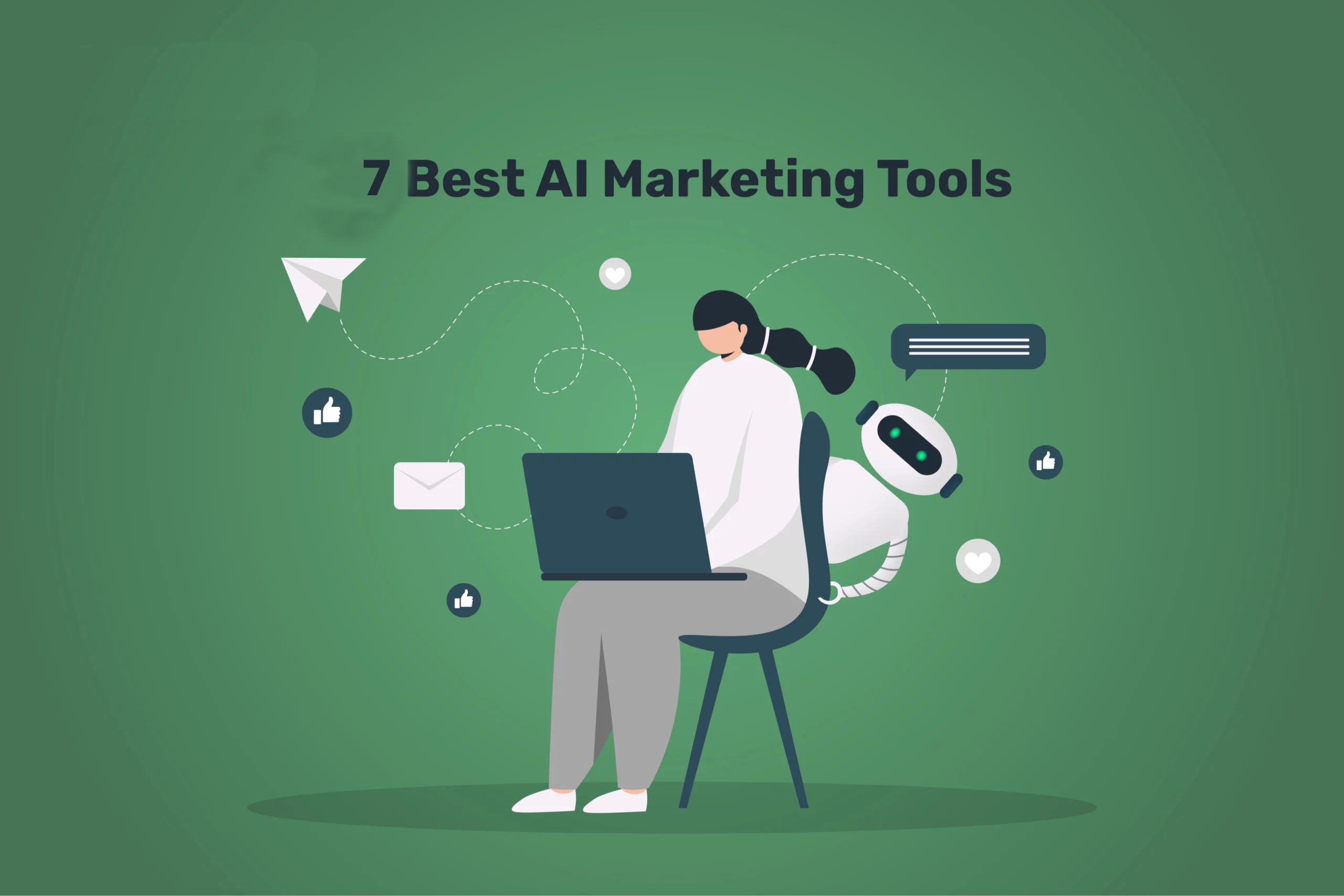Artificial Intelligence is a driving force behind many changes in today’s business landscape. It’s helping businesses work more efficiently, offering new ways to enhance customer experiences and making smarter decisions. With the rapid advancement of AI technologies, understanding their impact on various industries means AI in business is essential for companies aiming to stay competitive.
Types of AI technologies
AI refers to technology enabling machines to perform tasks requiring human intelligence. The main types of AI include:
- Machine Learning (ML): This allows machines to learn from data and improve their performance over time without being explicitly programmed for every specific task.
- Natural Language Processing (NLP): NLP enables AI to understand and respond to human languages, making it possible for machines to engage in conversations and interpret Text.
- Computer Vision: This technology allows AI to interpret and process visual information, such as recognizing objects in images or analyzing video content.
These components make AI versatile and valuable for many business applications, allowing machines to perform tasks ranging from simple data entry to complex decision-making.
The Role of AI in Enhancing Business Operations
AI plays a crucial role in streamlining business processes. By automating repetitive tasks, AI frees employees to focus on more strategic work. For example, in supply chain management, AI can predict delays, optimize delivery routes, and manage inventory levels. This leads to increased efficiency and reduced operational costs. A logistics company that uses AI-driven analytics can respond quickly to customer demands and adjust its operations in real time, ultimately improving service delivery.
Furthermore, AI helps businesses make informed decisions by analyzing vast data. AI systems can identify patterns and trends that humans might overlook. For instance, a retailer might use AI to analyze buying habits, enabling them to forecast demand and adjust their inventory accordingly. Companies leveraging AI for data-driven decision-making can enhance their strategic planning and boost their competitiveness in the market.
AI in Customer Service
AI has revolutionized customer service through chatbots and virtual assistants. These AI tools can handle common customer inquiries, allowing businesses to provide 24/7 support without human intervention. For example, a customer can interact with a chatbot on a website to get answers to frequently asked questions, place orders, or troubleshoot issues.
The benefits of AI in customer service extend beyond just availability. AI can analyze past interactions to personalize customer experiences, tailoring recommendations based on individual preferences. This level of personalization helps businesses foster stronger relationships with customers and enhances overall satisfaction.
Data-Driven Decision Making

Data is the lifeblood of modern businesses, and AI plays a critical role in extracting valuable insights from it. By analyzing large datasets, AI can uncover trends and correlations that inform decision-making processes. For instance, a company may use AI to analyze customer feedback and identify areas for improvement in its products or services.
Case studies demonstrate that businesses using AI-driven data insights are more likely to make quicker, more intelligent decisions. For example, a fast-food chain might utilize AI to analyze customer orders and optimize its menu offerings based on real-time demand, increasing sales and customer satisfaction.
AI in Marketing and Sales
In marketing and sales, AI transforms how companies engage with their customers. Predictive analytics allows businesses to forecast customer behavior and preferences. By analyzing data, companies can create targeted advertising campaigns that resonate with specific customer segments. This tailored approach increases the effectiveness of marketing efforts and improves return on investment.
Additionally, AI can automate routine marketing tasks, such as sending personalized emails or managing social media campaigns. By using AI to segment customers based on their behavior and interests, businesses can create more effective marketing strategies and drive higher conversion rates. Predictive analytics also plays a role in sales forecasting, enabling companies to anticipate demand and adjust their sales strategies accordingly.
Challenges and Ethical Considerations
While AI offers numerous benefits, its implementation comes with challenges and ethical considerations. One significant concern is data privacy. AI systems require extensive data to function effectively, raising questions about how businesses collect, store, and use this information. Companies must be transparent about their data practices and comply with regulations to protect customer privacy.
Another challenge is the potential for bias in AI algorithms. An AI system trained on biased data can lead to biased outcomes, affecting decision-making and perpetuating inequalities. To address these issues, businesses should implement ethical guidelines for AI use, ensuring fairness and accountability in their AI systems.
Future Trends in AI and Business
As AI technology evolves, new trends will further impact the business landscape. For instance, autonomous systems, such as self-driving vehicles and drones, could revolutionize transportation and logistics. Companies that leverage these technologies may gain a competitive edge in efficiency and cost-effectiveness.
Another trend is the integration of AI with other emerging technologies, such as the Internet of Things (IoT). This combination allows businesses to gather real-time data from connected devices and use AI to analyze this information, leading to more innovative operations and improved decision-making.
Experts predict that AI will continue to evolve, handling increasingly complex tasks and enabling businesses to automate more functions. To remain competitive, companies must adapt to these changes as AI becomes more integrated into business operations.
Getting Started with AI in Business
For businesses looking to adopt AI, there are practical steps to follow:

- Identify specific problems that AI can help solve. Understanding where AI can add value is crucial.
- Collect and organize data to feed AI systems. Data quality and quantity are essential for effective AI implementation.
- Research available AI tools and platforms that suit your business size and needs. Numerous options are available for small and medium enterprises.
- Train your team on the fundamentals of AI. Ensuring employees understand how to use AI tools effectively is vital for successful adoption.
Many resources, including online courses and AI-based software, are also available to help businesses implement AI solutions cost-effectively.
Conclusion
AI is transforming businesses’ operations, offering significant opportunities for increased efficiency, enhanced customer experiences, and data-driven decision-making. However, companies must consider ethical practices and potential challenges associated with AI implementation.
As AI advances, businesses that embrace this technology will likely gain a competitive edge, paving the way for future growth and innovation. By adopting AI, companies can stay relevant in an ever-changing landscape and position themselves for long-term success.





